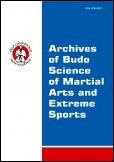2022, Volume 18, Issue 1
The material value of public safety in Poland in the face of 2021 migrant crisis – a pilot study
Paweł Piepiora1, Justyna Bagińska2, Zbigniew Piepiora3, Kazimierz Witkowski1
1Faculty of Physical Education and Sports, Wroclaw University of Health and Sport Sciences, Wrocław, Poland
2Wroclaw Business University of Applied Sciences, Wrocław, Poland
3Faculty of Environmental Engineering and Geodesy, Wrocław University of Environmental and Life Sciences, Wrocław, Poland
Author for correspondence: Paweł Piepiora; Faculty of Physical Education and Sports, Wroclaw University of Health and Sport Sciences, Wrocław, Poland; email: pawel.piepiora@awf.wroc.pl
Full text
Abstract
Background & Study Aim: Public security in the face of the current large-scale migration crisis in Central and Eastern Europe, which is the first since World War II, is an issue that should be examined taking into account various criteria (social, economic, political, extreme threat, etc.). The aim of this paper is to answer the research questions: (1) do people in Poland fear migrants? (2) how do they value public safety?
Material & Methods: To answer the research question, the authors conducted a survey and estimated the value of public safety with the use of the contingent valuation method. Because of the Covid-19 pandemic, the questionnaires were collected online (previously also sent online to academic communities throughout Poland). The research was carried out in Poland in November and December 2021 in an attempt to grasp the migrant crisis at the eastern EU border.
Results: According to the study results, the value of public safety in Poland amounts to PLN 210.8 billion (almost EUR 45 billion).
Conclusions: Based on the situation in Central and Eastern Europe in 2022, it was found that most respondents are not afraid of migrants. Such a result should encourage further in-depth analyses of the broadly understood phenomena of personal security and social security, taking into account also other empirical variables including
Key words: willingness to pay, willingness to accept, contingent valuation method





